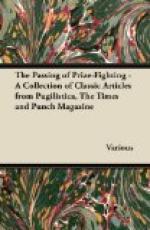O ship that farest forth, a greater Argo,
Unto the homeland of the woolly
fleece,
Soft gales attend thee! may thy precious
cargo
Slide over oceans smoothed
of every crease,
So
as the very flower, or pick,
Of England’s flanneled chivalry
may not be sick!
And thou, O gentle goddess Hygieia,
Hover propitious o’er
the vessel’s poop;
Keep them from chicken-pox and pyorrhoea,
Measles and nettle-rash and
mumps and croup;
See
they digest their food and drink,
And land them, even as they leave us,
in the pink!
Thou, too, whose favour they depend so
much on
(Fortune, I mean) in this
precarious game,
Oh let there be no blob on their escutcheon,
Or, if a few occur, accept
the blame;
Do
not, of course, abuse thy powers;
We’d have the best side win, but
let that side be ours.
Summer awaits them there while we are
wheezing
By empty hearths through bitter
days and black;
Yet we rejoice that, though we die of
freezing
And cannot get cremated, all
for lack
Of
coal to feed our funeral pyres,
Still “in our ashes [yonder] live
their wonted fires.”
O.S.
* * * * *
THE MINISTRY OF ANCESTRY.
“As you are aware,” said a prominent official of the Ministry of Ancestry, “although our department has only been in existence for a few months the profits have enabled the Government to take twopence off the income-tax and to provide employment for thousands of deserving clerks dismissed, in deference to public opinion, from other Government offices.”
“Yes. Could you tell me how this brilliant scheme came into being?”
“The Chinese knew and practised it for centuries. Here the credit for its re-discovery must be assigned to Sir Cuthbert Shover, who, owing to handsome contributions to necessary funds, combined, of course, with meritorious public service during the War, was offered a baronetcy. He refused it for himself, but accepted it for his aged father, thereby becoming second baronet in three months. He deplored the fact that his grandfather was no longer eligible for the honour. Then we saw light. Why should the mere accident of death prevent us from honouring a man if his family were prepared to contribute towards the country’s exchequer? But these letters will give you a clearer insight into the working of the department.”
The first letter was addressed to Miss Cannon, at Maidstone:—
“Dear madam,—We have no hesitation in advising you to have a bishop in your family. Few purchases give greater satisfaction. If, as you say, your late maternal grandfather was curate of Slowden, and was, as far as you are aware, a man of exemplary character, we could make him a bishop without delay. Your home being in Kent, it occurs to us that the see of Carlisle would suit the Right Reverend Prelate best. The cost of the proceedings, including a pre-dated Conge d’Elire, would be eight hundred guineas. An archbishopric would be slightly more expensive and, in our opinion, less suitable.”
“Amazing,” I said.




